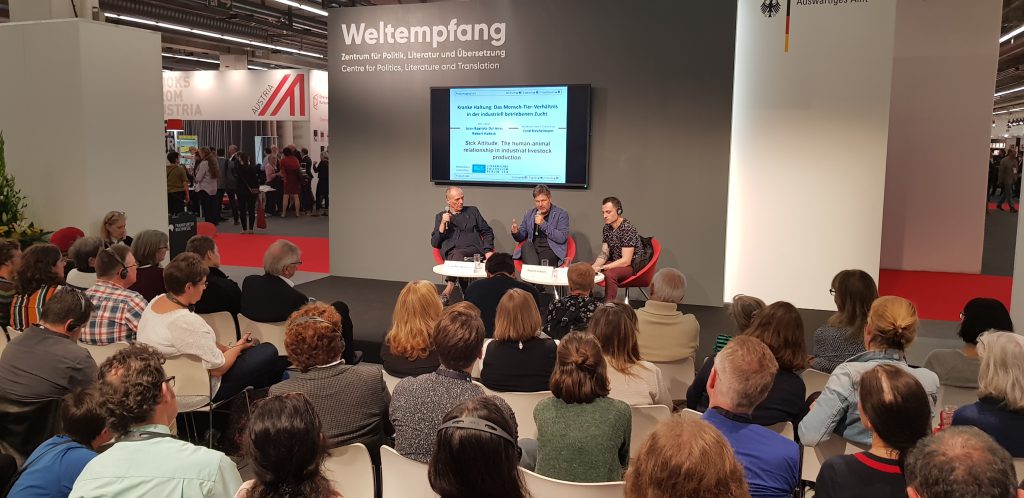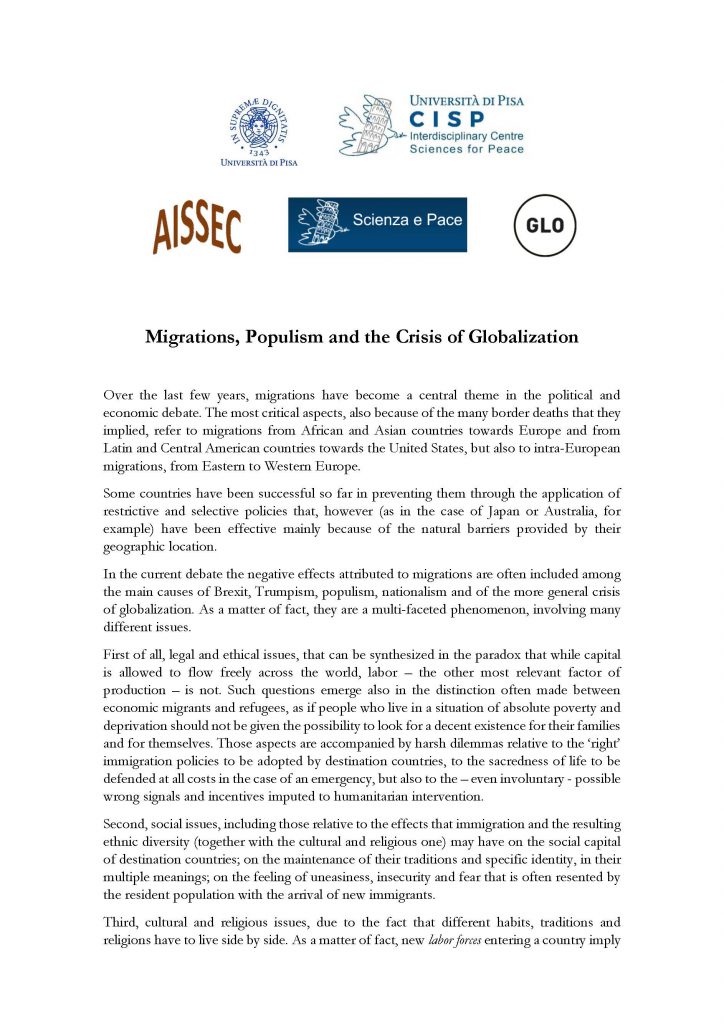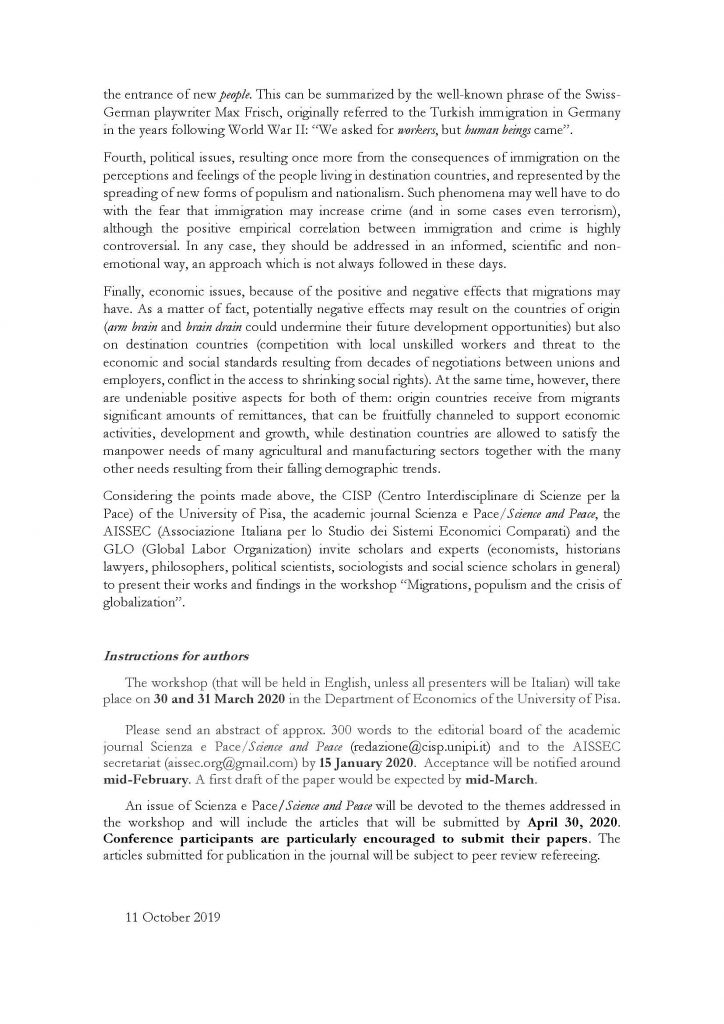Bundeskunsthalle Bonn: “Bundespreis für Kunststudierende” — FEDERAL PRIZE FOR ART STUDENTS. Reflection challenges.
Ends;
Bundeskunsthalle Bonn: “Bundespreis für Kunststudierende” — FEDERAL PRIZE FOR ART STUDENTS. Reflection challenges.


Ends;
On September 12-13, 2019 the 34th Annual Conference of the Italian Association of Labour Economists (AIEL) took place in Novara/Italy. During the conference, a joint session AIEL-CCME/GLO was organized. Please find here the program with the speakers in bold, the bio of the speakers and the paper abstracts. The report was provided by Francesco Pastore (University of Campania Luigi Vanvitelli), GLO Country Lead Italy and GLO Thematic Cluster Lead School-to-Work Transition.
Organizer and chair: GLO Fellow Enkelejda Havari (European Commission JRC)
Antonella Rocca (University of Naples Parthenope), Floro Ernesto Caroleo (University of Naples Parthenope and GLO), Francesco Pastore (University of Campania Luigi Vanvitelli and GLO), Claudio Quintano (University of Naples Parthenope):
The School-to-Work Transition: What Affects Mainly its Duration?
Elena Claudia Meroni (European Commission JRC), Daniela Piazzalunga (Università di Verona), Chiara Pronzato (Università di Torino):
Use of Extra-school Time and Child Behaviour
Enkelejda Havari (European Commission JRC and GLO), Franco Peracchi (Georgetown University, EIEF and University of Rome “Tor Vergata”):
Intergenerational Effects of War on Education: Evidence from World War II in Europe
Silvia Granato (University of Warwick):
Early Influences and the Gender Gap in STEM




Antonella Rocca is Aggregate Professor in Economic Statistics (Qualified as Associate Professor) at the Department of Management and Quantitative Studies, (Excellence Department), University of Naples “Parthenope”, Italy, where she teaches “Statistics for Business” and “Information systems for decision-making processes in public administration”. Her research interests concern labor markets, with a focus on the most disadvantaged groups (young people, women, immigrants). She uses econometric models and decomposition techniques for the analysis of economic gaps and constructs composite indicators for cross-countries comparisons. She collaborates with the European Commission and other international scientific organizations as expert for the evaluation of scientific projects.
Elena Claudia Meroni is Research Fellow at the European Commission, Joint Research Centre (Ispra, Italy). She is part of the Competence Centre on Microeconomic Evaluation (CC-ME), within the Monitoring, Indicators and Evaluation unit. She holds a PhD in Statistics from the University of Padua. During her PhD she has been a visiting scholar at Pompeu Fabra University. Her main research interests are policy evaluation, economics of education, labour economics, economics of the family and demography.
Enkelejda Havari is Research Fellow at the European Commission, Joint Research Centre (Ispra, Italy). She is part of the Competence Centre on Microeconomic Evaluation (CC-ME), within the Monitoring, Indicators and Evaluation unit. Before joining the Commission in 2015, she was a Visiting Scholar and Lecturer at the Economics Department of Boston University and a Post-Doctoral researcher at the University of Ca’ Foscari Venice. She holds a Ph.D. in Econometrics and Empirical Economics from the University of Rome “Tor Vergata” and a M.Sc. in Economics from the University of Bologna. Her research interests lie in the area of applied micro-econometrics and impact evaluation with a special focus on labour economics, economics of education, and family economics.
Silvia Granato is Research Fellow at the European Commission, Joint Research Centre (Ispra, Italy). She is part of the Competence Centre on Microeconomic Evaluation (CC-ME), within the Monitoring, Indicators and Evaluation unit. Before joining the Commission in September 2019 she was a Teaching Fellow at the Economics Department of Warwick University, teaching courses on labour economics and applied economics. In 2018 she completed her PhD in Economics at Queen Mary University of London, after obtaining two Master’s Degrees in Economics – at the University of Naples and at the Barcelona Graduate School of Economics. Her main research interests are in the area of applied micro-econometrics, in particular topics related to economics of education and gender economics.
The school to work transition: What affects mainly its duration?
Antonella Rocca (University of Naples Parthenope) with Floro Ernesto Caroleo (University of Naples Parthenope), Francesco Pastore (University of Campania Luigi Vanvitelli), Claudio Quintano (University of Naples Parthenope)
In this research, the authors analyze the School-To-Work Transition (STWT) in a selection of 21 European countries by level of education (low and medium vs high education). The main scope of this research consists in identifying the determinants of such different durations of the STWT across the countries considered. Duration models based on survivor functions are used including a wide spectrum of factors linked to personal characteristics, labour market and institutional factors and aspects related to the education system and the type of transition regime. The authors contribute to the existing literature in many ways. First of all, they analyze the duration of STWT rather than unemployment duration. Second, a separate analysis of low and medium educated is provided, which is usually neglected in previous studies. Data refer to the EU-SILC cross-sectional waves from 2013 to 2017. All sample units aged between 18 and 34, who completed education two years before, are included in the analysis. Those who are attempting military service, student-workers and permanent disabled are also excluded from the analysis. Results suggest that, even after controlling for all these factors, Continental and Liberal countries show performances significantly higher in comparison above all with the countries of the Mediterranean regime. Another important result is that, after the model has been corrected to account for unobserved heterogeneity, data show positive duration dependence, that means that the probability of achieving a job increases with time but also the need to improve the set of indicators for the education system monitoring and the importance of individual characteristics not captured by the observed covariates.
Use of extra-school time and child behaviour
Elena Claudia Meroni (European Commission JRC) with Daniela Piazzalunga (University of Verona) and Chiara Pronzato (University of Turin)
In this paper, we study the effects of extra-school activities on children’s non-cognitive development, using data from the Millennium Cohort Study (UK) and focusing on children aged 7-11 years old. We classify the time spent out of school into six homogenous groups of activities, using principal component analysis, and estimate the relationship thereof with five behavioural dimensions drawn from the Strength and Difficulties questionnaire, exploiting the panel structure of the data. Results show the beneficial effects on children’s behaviour of sports, school-related activities, time with parents and household chores, while a small detrimental effect of video-screen time is detected. We test the robustness of our estimates against omitted variable bias, and the results are confirmed.
Intergenerational effects of war on education: Evidence from World War II in Europe Enkelejda Havari (European Commission JRC) with Franco Peracchi (Georgetown University, EIEF and University of Rome “Tor Vergata”)
The negative effects of war on the education and health of the civilian population are well documented. However, there is no evidence on whether these effects extend to subsequent generations. To fill-in this gap we analyze the inter-generational effects of World War II on educational attainments focusing on parent-child dyads in which parents were born in 1926– 1949. We show two things. First, parents who suffered the war, that is, were exposed to major war events or personally experienced war-related hardship, ended up with less schooling than parents with similar characteristics who did not. Second, the children of parents who suffered the war have lower educational attainments than the children of parents with similar characteristics who did not suffer the war. Our reduced form results also suggest estimates of the coefficient of inter-generational transmission of education based on war-related hardships as instruments. These estimates show that mother’s education matters more for daughters, whereas father’s education matters more for sons.
Early influences and the gender gap in STEM
Silvia Granato (University of Warwick)
Despite the striking reversal of the gender gap in industrialized countries in the last 40 years, women still pursue degrees in science, technology, engineering and mathematics (STEM) much less than their male peers do. I use data from a uniquely rich and largely unexplored source that combines both administrative and survey information on the population of Italian graduates to analyse the determinants of gender gaps in STEM graduation rates for Italian college leaving cohorts from 2010 to 2015, with emphasis on family, cultural and school influences, as well as geographic proximity in the supply of STEM degrees. Half of the gender gap in STEM graduation is attributed to the gender difference in maths and science content of the respective high school curricula. My results indicate that in Italy the gender gap in STEM graduation has its roots in a gendered choice originating many years before. This finding suggests that the role of the influence of environmental factors – such as the family – in the different educational choices of females and males is even greater than can be estimated through this study.
Ends;
GLO is collaborating in the Organization of The Global Interdisciplinary Policy Research Conference on Youth Transitions, organized by the Center for Finance and Development of the Graduate Institute of International and Development Studies, on the 20-21 February 2020 in Geneva/Switzerland.
The Conference, organized with the support of multiple partners, will bring together researchers from academia across disciplines with policy practitioners across public and private stakeholders, to review the state of policy research and debate on youth transitions.
Multiple dimensions of youth transitions will be discussed: the crises in school to work transition and future of work prospects for young people; youth transitions in situations of conflict and peace-building; and youth participation in civic and political spheres.
The Conference will also launch the first Global Network of Policy Research on Youth Transitions that will promote and partner for expanded policy and research interface on priority issues.
To participate, please register at the Conference Webpage. Attendance is free, however participants will have bear their own cost of travel and accommodation. Program.
For partnerships and contributions to the debate and to the future Global Network, please contact GLO Policy Director Azita Berar by November 15, 2019.


Ends;
A new GLO Discussion Paper finds for Portugal that while wages of continuing workers were increasing following an extension, formal employment and wage bills in the relevant sectors were falling.
The Global Labor Organization (GLO) is an independent, non-partisan and non-governmental organization that functions as an international network and virtual platform to stimulate global research, debate and collaboration.
GLO Discussion Paper No. 413, 2019
30,000 minimum wages: The economic effects of collective bargaining extensions – Download PDF
by Martins, Pedro S.
GLO Fellow Pedro S. Martins
Author Abstract: Many governments extend the coverage of collective agreements to workers and employers that were not involved in their bargaining. These extensions may address coordination issues but may also distort competition by imposing sector-specific minimum wages and other work conditions that are not suitable for some firms and workers. In this paper, we analyze the impact of such extensions along several economic margins. Drawing on worker- and firm-level monthly data for Portugal, a country where extensions have been widespread, and the scattered timing of the extensions, we find that, while continuing workers experience wage increases following an extension, formal employment and wage bills in the relevant sectors fall, on average, by 2%. These results increase by about 25% across small firms and are driven by reduced hiring. In contrast, the employment and wage bills of independent contractors, who are not subject to labor law or collective bargaining, increases by over 1% following an extension.
GLO Discussion Papers are research and policy papers of the GLO Network which are widely circulated to encourage discussion. Provided in cooperation with EconStor, a service of the ZBW – Leibniz Information Centre for Economics, GLO Discussion Papers are among others listed in RePEc (see IDEAS, EconPapers). Complete list of all GLO DPs – downloadable for free.

Ends;
A new GLO Discussion Paper assesses the effects of introducing centralized scoring standards into schools with higher and lower quality peer groups.
The Global Labor Organization (GLO) is an independent, non-partisan and non-governmental organization that functions as an international network and virtual platform to stimulate global research, debate and collaboration.
GLO Discussion Paper No. 412, 2019
Does Increased Teacher Accountability Decrease Leniency in Grading? – Download PDF
by Puhani, Patrick A. & Yang, Philip
GLO Fellow Patrick A. Puhani
Author Abstract: Because accountability may improve the comparability that is compromised by lenient grading, we compare exit exam outcomes in the same schools before and after a policy change that increased teacher accountability by anchoring grading scales. In particular, using a large administrative dataset of 364,445 exit exam outcomes for 72,889 students, we assess the effect of introducing centralized scoring standards into schools with higher and lower quality peer groups. We find that implementation of these standards increases scoring differences between the two school types by about 25 percent.
GLO Discussion Papers are research and policy papers of the GLO Network which are widely circulated to encourage discussion. Provided in cooperation with EconStor, a service of the ZBW – Leibniz Information Centre for Economics, GLO Discussion Papers are among others listed in RePEc (see IDEAS, EconPapers). Complete list of all GLO DPs – downloadable for free.

Ends;
A new GLO Discussion Paper provides a state-of-the-art literature review about research that aims to explain the return, repeat, circular and onward migration of the highly-skilled migrants around the world.
The Global Labor Organization (GLO) is an independent, non-partisan and non-governmental organization that functions as an international network and virtual platform to stimulate global research, debate and collaboration.
GLO Discussion Paper No. 411, 2019
Return, Circular, and Onward Migration Decisions in a Knowledge Society – Download PDF
by Constant, Amelie F.
GLO Fellow Amelie Constant
Author Abstract: This chapter provides a state-of-the-art literature review about research that aims to explain the return, repeat, circular and onward migration of the highly-skilled migrants around the world. After it describes the status quo in the knowledge economy and the international race for talent, it presents the relevant theories and concepts of migration in the social sciences and how these theories accommodate the phenomena of return, repeat and onward migration. A special section is devoted to selection. The chapter then summarizes, evaluates, and juxtaposes existing empirical evidence related to theoretical predictions. Observables such as education, income, gender and home country as well as unobservables such as ability, social capital and negotiating skills play a strong role in influencing return, repeat and onward migration decisions. Yet, there is no consensus on the direction of the effect. The chapter discusses shortcomings and limitations along with policy lessons. It concludes by highlighting holes in the literature and the need for better data.
GLO Discussion Papers are research and policy papers of the GLO Network which are widely circulated to encourage discussion. Provided in cooperation with EconStor, a service of the ZBW – Leibniz Information Centre for Economics, GLO Discussion Papers are among others listed in RePEc (see IDEAS, EconPapers). Complete list of all GLO DPs – downloadable for free.

Ends;
Impressions from a visit on October 16, 2019. #Tatort; Saša Stanišić – Winner of the Novel of the year 2019 Award for “Herkunft”; Robert Habeck – German writer and politician, co-chairperson of Alliance ’90/The Greens, a potential candidate for chancellor, spoke about “The human-animal relationship in industrial livestock production”.







Ends;
March 30-31, 2020 in Pisa, Italy. The GLO supported workshop on “Migrations, Populism and the Crisis of Globalization” will take place at the Department of Economics of the University of Pisa. Submission deadline is 15 January 2020. For a detailed conference announcement see below.


Ends;
A new GLO Discussion Paper reviews gender identity and workplace legislation at national and international levels across Europe.
The Global Labor Organization (GLO) is an independent, non-partisan and non-governmental organization that functions as an international network and virtual platform to stimulate global research, debate and collaboration.
GLO Discussion Paper No. 410, 2019
Gender identity minorities and workplace legislation in Europe – Download PDF
by Sidiropoulou, Katerina
GLO Fellow Katerina Sidiropoulou
Author Abstract: It is a fact that transgender people experience severe discrimination in various forms not only in their everyday lives but also in their working lives, especially when transitioning. It seems that Europe is slowly changing over the years as there are constant calls to tackle this complex issue by considering the inclusion of a third gender option, the abolition of any abusive practices, recommendations for legal redress in cases of violation, and a more transparent and self-determined legal recognition procedure. There are national laws which offer protection on the basis of gender identity at national and international levels. Nevertheless, there is still a lack of uniformity due to a number of unresolved matters such as uncertainty about who is covered, whether gender identity should be covered as a protected ground, what is required to gain a legal change of name and gender marker in official documents, who is responsible for authorization and uncertainty over the stages, nature and duration of the actual procedure. Fewer distressed transgender employees and transphobic incidents are observed when there is greater social acceptability, organizational effort and national intervention. Research and collective actions by movements, political leaders, academics, medical experts and non-governmental organizations are further required to minimize societal and employment exclusions of transgender people.
GLO Discussion Papers are research and policy papers of the GLO Network which are widely circulated to encourage discussion. Provided in cooperation with EconStor, a service of the ZBW – Leibniz Information Centre for Economics, GLO Discussion Papers are among others listed in RePEc (see IDEAS, EconPapers). Complete list of all GLO DPs – downloadable for free.

Ends;
In his new book, GLO Research Director Danny Blanchflower has explained us why the job market is not as healthy as we think, in particular he promotes to look at underemployment instead of unemployment. glabor.org had announced the book earlier this year and published in the summer an interview with the author. In her book review for the LSE Review of Books website, GLO Fellow Hélène Syed Zwick provides more details and insights, but also formulates questions and challenges.
GLO Research Director David G. Blanchflower. GLO bio. He is the Bruce V. Rauner Professor of Economics at Dartmouth College, Professor of Economics at the University of Stirling, and a Research Associate at the National Bureau of Economic Research.
GLO Fellow Hélène Syed Zwick. GLO bio. She is Executive Director of the ESLSCA Research Center and Associate Professor in Economics at ESLSCA University (Egypt).



Book review for the LSE Review of Books website:
“In Not Working: Where Have All the Good Jobs Gone?, David Blanchflower contributes to the already substantial stream of scholarship on job quality, happiness and economic downturns. The author, a prominent economist and former external member of the Bank of England’s Monetary Policy Committee (MPC) between 2006 and 2009, offers a praiseworthy, didactic and anticipated analysis ‘on well-paying [or good] jobs and the failure of policymakers to deliver them’ (11).
In the first part of the book, the author skillfully argues that most Western countries, especially the US and the UK, are far away from full employment, despite their respective low unemployment rates. Through a heavy reliance on data, he argues, and brilliantly demonstrates, that the unemployment rate is no longer an accurate signal of labour market slack. He repeats throughout his book that the main signal that confirms this hypothesis is the lack of sustained wage and price growths. Normally, Blanchflower explains, in a situation of full employment, there ‘would be so few people looking for jobs’ (25) that wages would grow rapidly and ‘workers would be able to climb the occupational ladder’ (140). Unfortunately, he writes, this is not happening either in the US or the UK. On the contrary, underemployment – which relates to ‘unstable, precarious, low-paying, and temporary jobs’ (35) and which expanded after the Great Recession in most rich Western countries – appears as a significant new predictor of wage and inflation growth. Here we reach the central argument of the book: underemployment associated with weak bargaining power on the part of workers leads to contained wage pressure. Blanchflower advises that we therefore rely on underemployment rather than unemployment to analyse the labour market situation, especially within this post-recession period characterised by ‘an extended semi-slump, of subnormal prosperity’ (80).
If such a proposal is quite orthodox, three elements transversal to this first part capture the reader’s attention: the economics of walking about (EWA); the societal consequences; and house-ownership and mobility. Firstly, thanks to Blanchflower’s EWA approach which is ‘fundamental’ to the book (184), he is in contact with what has been happening to ordinary people. As he explains, Blanchflower believes in data from the real world. His thinking has been ‘driven mostly by observing how the world works and attempting to uncover fundamental truths and patterns in the data’ (9). Discussions with London cabbies or looking at jingle mails (the act of mailing the keys back to the mortgage lender) are common ways for Blanchflower to feel what is going on in societies. Secondly, he discusses the links between feelings of insecurity on the labour market, happiness and societal outcomes like obesity, mental disorders, depression and even suicide. Thirdly, he examines the negative impact of house ownership on mobility. He evokes the fall in the homeownership rate, especially in the US and the UK, and explains that an unconstrained housing market leads to more efficient labour markets and to a fall in the equilibrium unemployment rate thanks to higher mobility. These effects have too often been neglected by researchers, he argues.
The second part of Not Working is composed of five chapters and aims to study the response to the Great Recession. Blanchflower’s analysis led him to anticipate the crisis in 2007, while most of his colleagues did not. The author calls therefore for a ‘big rethink’ (11, 315), especially among policymakers, central bankers and economists. Scathingly, he denounces their obstinacy in relying on theoretical, mathematical-based models and prescriptions from the 1970s. As he argues, ‘the elites were stuck in the past’ (171) and ‘the experts were looking in the wrong places’ (162). Policymakers decided in 2009-10, under the recommendations of economists, to launch what Blanchflower names a ‘reckless and unnecessary austerity’ (173) ‘attacking the Keynesian school of thought from multiple directions’ (171). The author writes that this was a ‘unique opportunity [for them] to decrease the size of the state’ (173).
In this section of the book, Blanchflower’s efforts may appear overly detailed to the less specialised reader and not especially innovative for the specialists. Yet, he convincingly establishes the socio-economic, demographic and geographic profile of the ‘left-behinds’ in the US, the UK and Eurozone countries after 2010. Unsurprisingly, decreases in expenditure ‘hit the weak, the disabled and vulnerable’ (214). Such fractures between the have-nots and haves were already present before the Great Recession, which only ‘exacerbated them’ (37). He notes that the left-behinds from the US, the UK, France and Austria have been ‘strongly opposed to political and social developments they see as threatening sovereignty, identity and continuity’ (258). He therefore indicates that he was already expecting in 2010 a political ‘backlash’ (265) after all the pain and suffering. Why should politics not therefore suffer? Few can have ignored recent populist movements in the US with Donald Trump’s presidency, in the UK with the Brexit vote and in France with Marine Le Pen. The author establishes a direct relationship between the profile of the left-behinds and those who voted for populist parties.
This inquiry leads us to the third part dedicated to prescriptions and policy recommendations. Whilst the quality of analysis and richness of its scholarly references impresses across two-thirds of the book, here the author fails in making the reader optimistic or confident about the future. Why? First, because the recommendations he formulates are unoriginal and lack ambition, and second, because several dimensions elsewhere detailed in the book, like the decline in unionism and bargaining power, are not even discussed. Strictly speaking, the use of idioms and expressions in the titles and subtitles in this third part appear by far insufficient to convince me. Most of the Keynesian recommendations that he formulates are well-known and have been debated for decades. For instance, he recommends reaching full employment by decreasing the interest rate to boost wages and therefore living standards, investing more in infrastructure to create jobs, subsidising childcare services and providing incentives for low-skilled workers. From my point of view, such advice relies far too much on the intervention of public authorities, which seems quite inconsistent with Blanchflower’s lack of trust in policymakers and politicians that he claims throughout his book: ‘Why believe them?’ he asks several times. ‘Why should we trust any of them now? I don’t,’ he writes (211).
It could certainly be argued that this third part is disappointing as Blanchflower fails to provide sufficient depth in the formulation of his recommendations, which is essential once the analysis has been delivered. However, even with this limitation, this encyclopedic book is highly welcome and will be an unquestionably worthy addition to the bookshelves of a general readership as well as scholars in labour economics, macroeconomics, monetary economics and political science.”
Dr. Hélène Syed Zwick, Executive Director of ESLSCA Research Center, ESLSCA University, Egypt
This work is licensed under a Creative Commons Attribution-NonCommercial-NoDerivs 3.0 Unported License.
Ends;